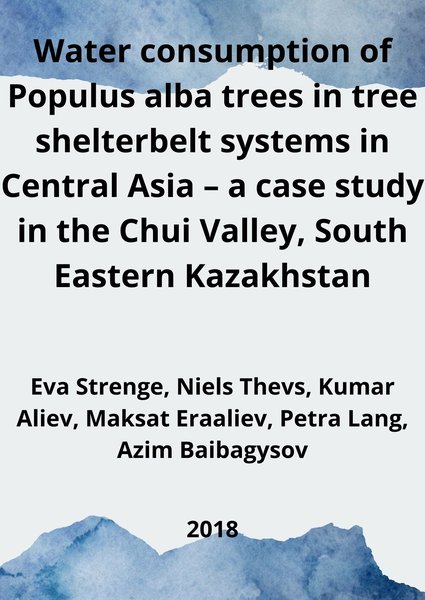




Год: 2018
Разделы: Научные публикации
Темы: Вода
Авторы: Thevs Niels, Aliev Kumar, Strenge Eva, Eraaliev Maksat, Lang Petra, Baibagysov Azim
Страны: Казахстан
Источник: Central Asian Journal of Water Research
Файлы для скачивания:
Agriculture in Central Asia largely relies on irrigation. The water is withdrawn from the rivers of the region, which predominantly originate from snowfields and glaciers. Due to global warming, these water resources are expected to decline substantially, resulting in an aggravation of already existing water scarcity. Tree shelterbelt systems, as the most prominent practice of agroforestry in Central Asia, are reported to help to reduce water consumption in irrigated agriculture. Populus. alba is one of the most important shelterbelt trees in Central Asia. Though, studies about water consumption of shelterbelts are lacking. Therefore, the objectives of this study are to (1) investigate water consumption of Populus alba trees in a shelterbelt system in Central Asia and (2) analyze the influence of local climatic conditions on the sap flow of such a shelterbelt. Tree water consumption was assessed through sap flow measurements on three trees in a crop shelterbelt system in the Chui Valley in South Eastern Kazakhstan during June and July 2016. The average daily water consumption was 187.6 l/d, 44.8 l/d, and 160 l/d for the trees, respectively. These results were extrapolated for a representative shelterbelt section. Water consumption of that section was 7.8 mm/d, while average ETo was 5.3 mm/d. Considerable influences of water vapor saturation deficit, air temperature and relative humidity on the sap flow could be observed. Solar radiation played a role, too, whereas little or no influence of wind speed on tree water consumption was found.
По всем вопросам сотрудничества обращайтесь по эл.адресу или телефону: